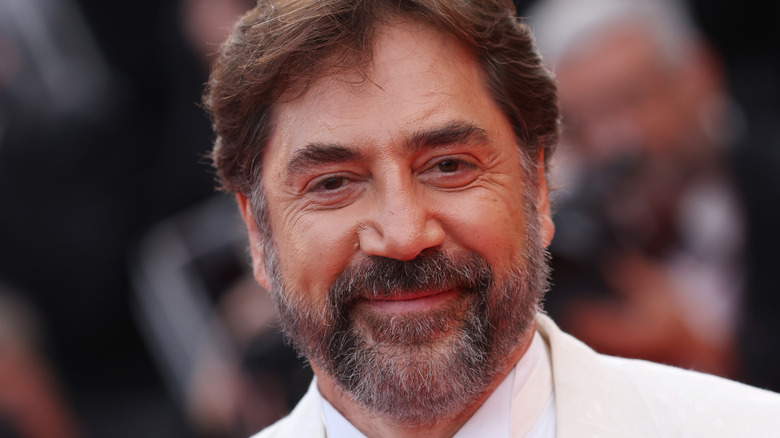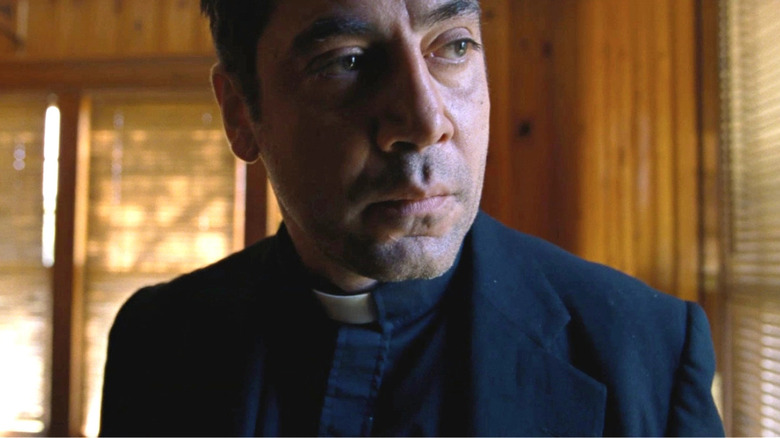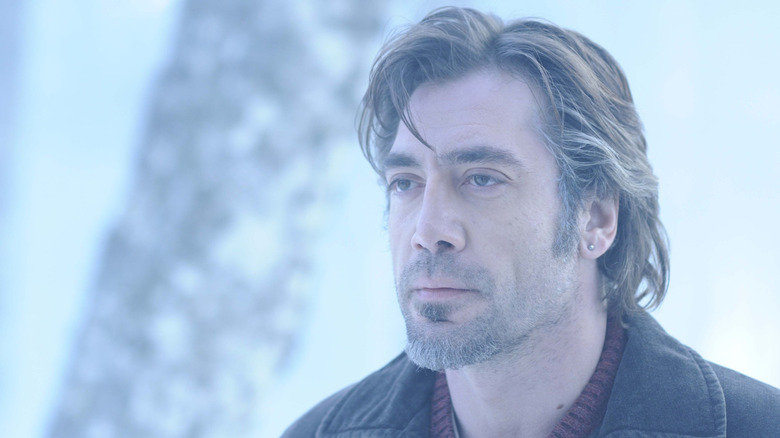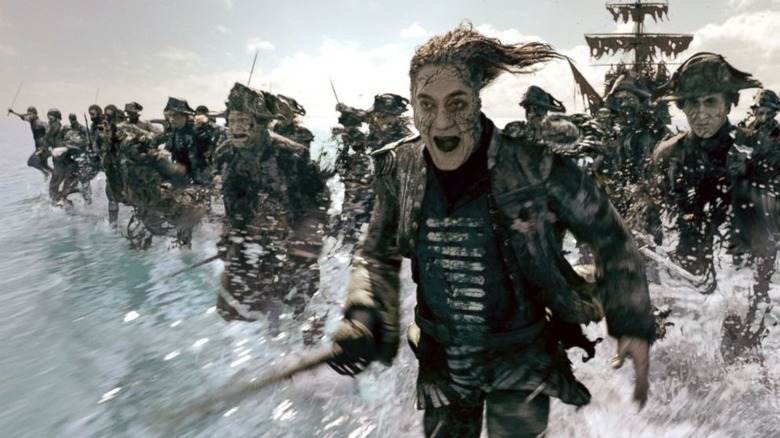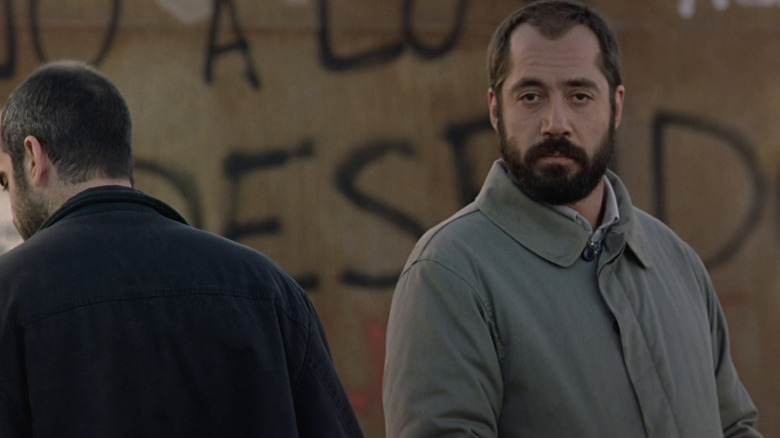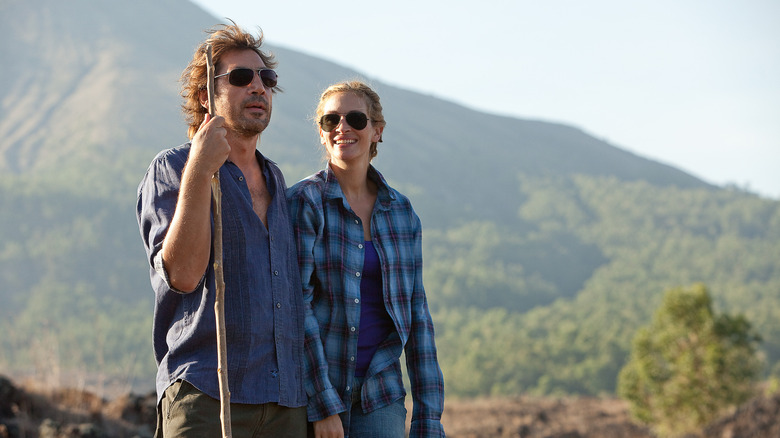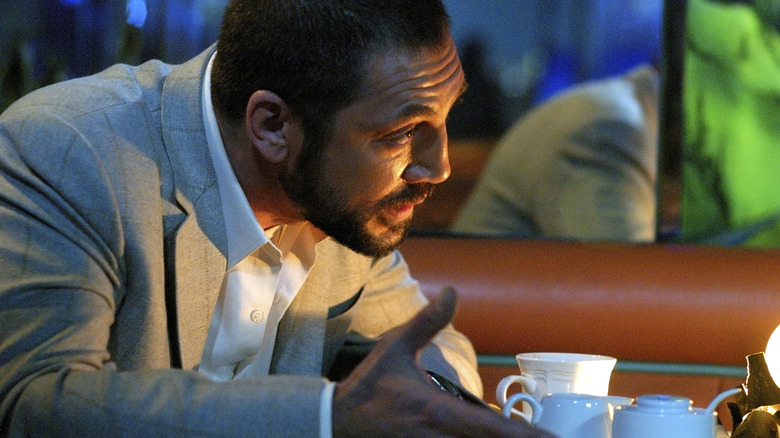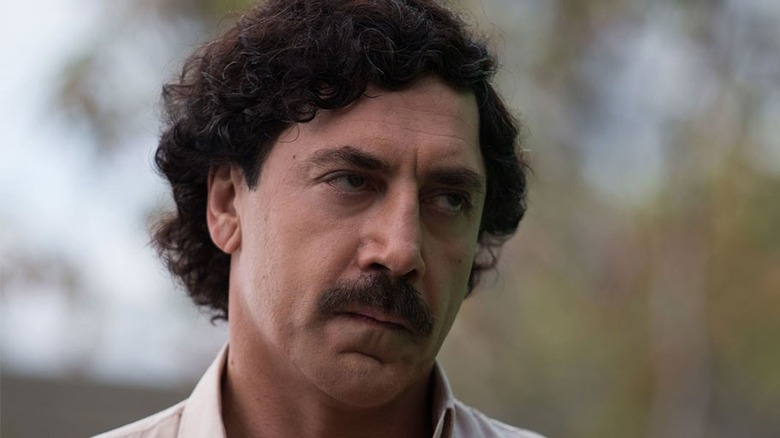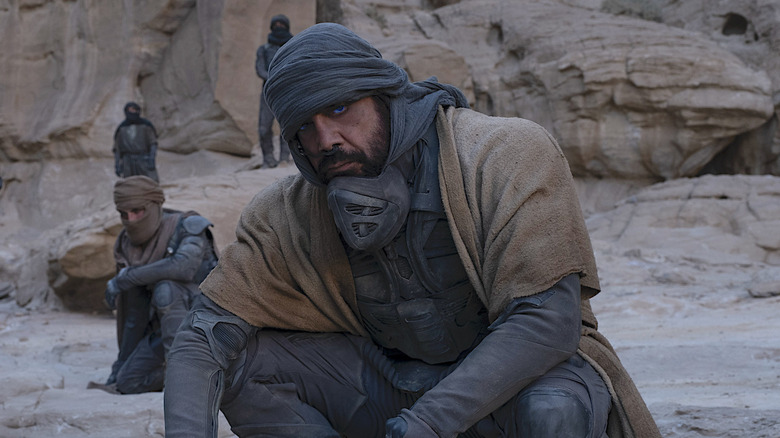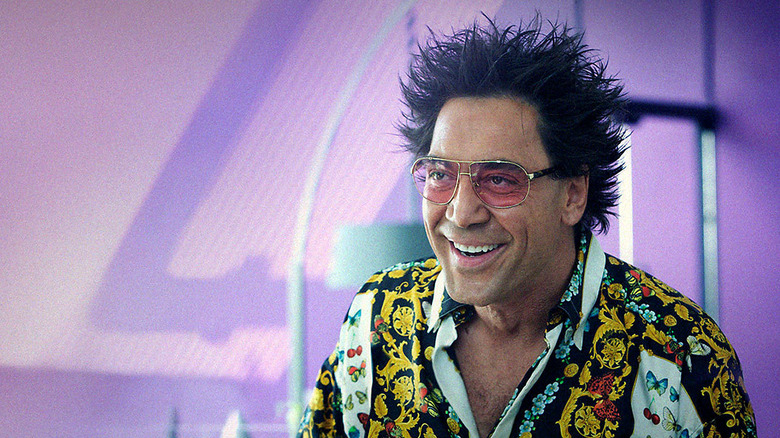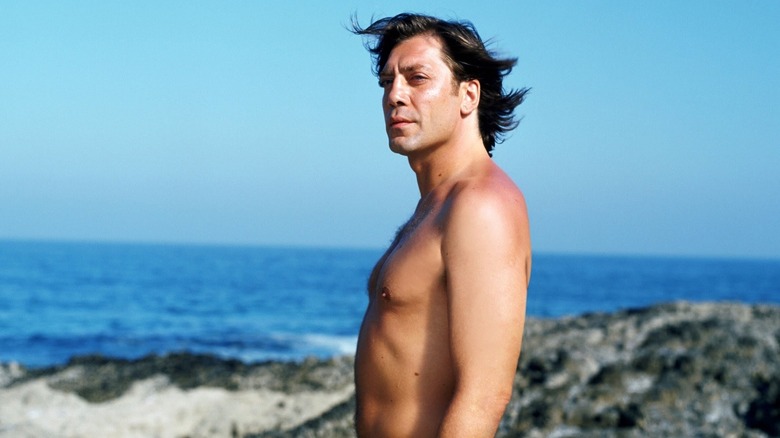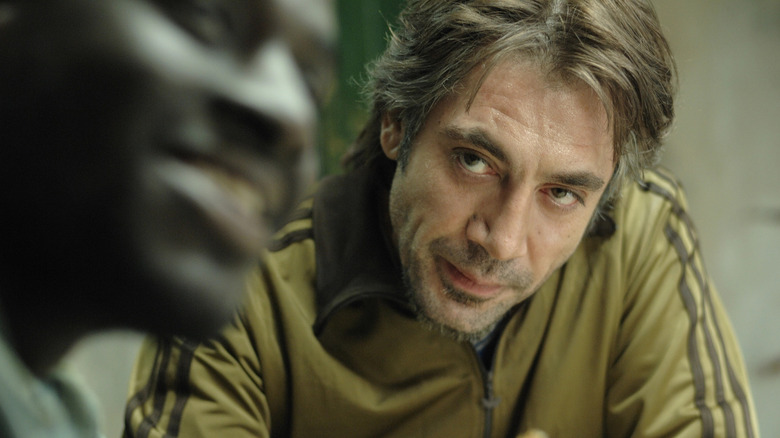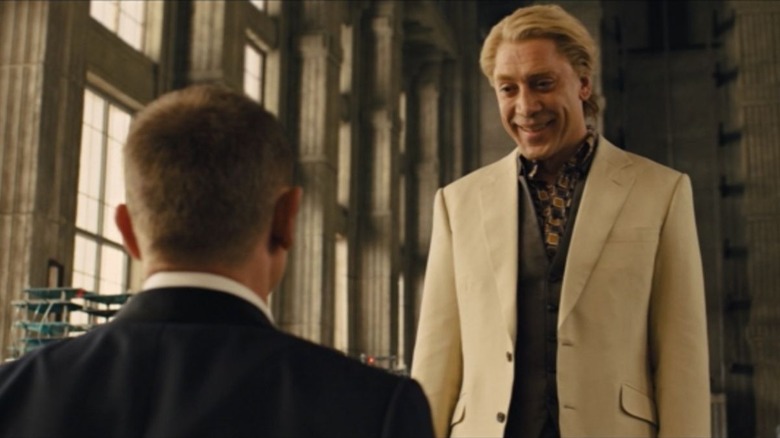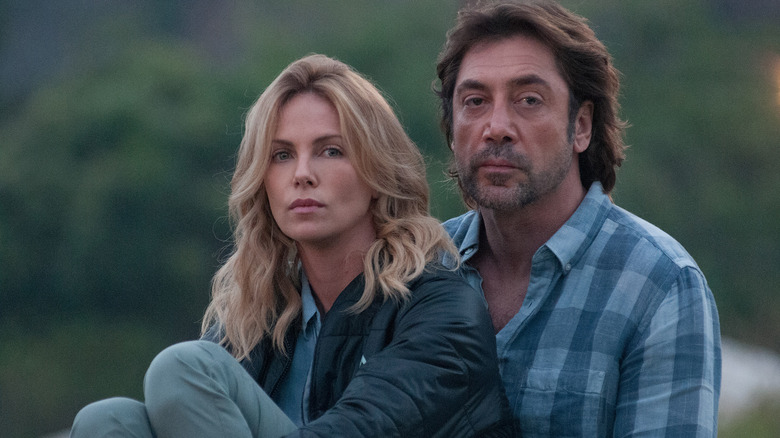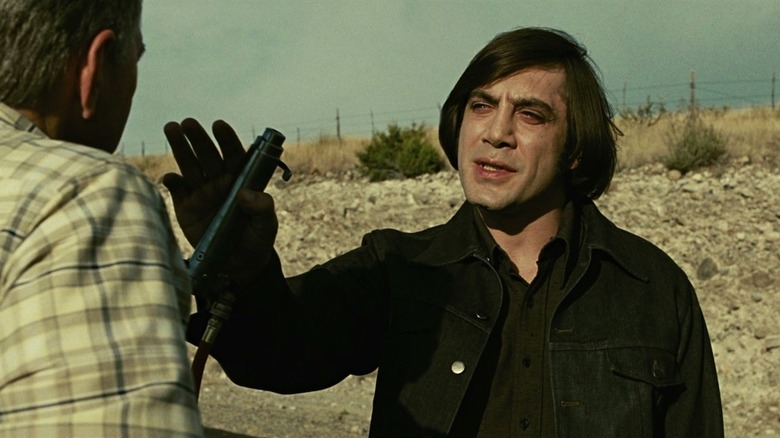Javier Bardem's 7 Best And 7 Worst Movies Ranked
Best known for his performances in "No Country for Old Men" and "Biutiful," Spanish actor Javier Bardem has enjoyed an illustrious 30-year career in film. For the first decade of his career, Bardem exclusively starred in Spanish-language movies. But in Julian Schnabel's 2000 biopic "Before Night Falls," Bardem began making his transition to English-language cinema.
In 2007, Bardem became the first Spanish actor to win an Academy Award for Best Actor for his role in "No Country For Old Men," and he would go on to make impressions in a wide range of genres, spanning from romantic comedies to gritty action thrillers.
Bardem has played everything from notorious drug lords to James Bond villains, stopping for lighthearted supporting roles and bit parts in blockbusters along the way. But with a filmography as diverse as his, Bardem has his ups and downs on-screen. Here are his seven best and seven worst movies ranked.
Worst: To the Wonder
"To the Wonder," the follow-up to New Hollywood auteur Terrence Malick's acclaimed "The Tree of Life," didn't live up to expectations. Though it was nominated for the Golden Lion Award at the 2012 Venice Film Festival, the movie made less than $3 million at the box office and garnered a mixed critical reception.
The film centers around Neil (Ben Affleck) and Marina (Olga Kurylenko), a couple who fell in love in Paris and are now attempting to assimilate into a life together in Oklahoma, where Neil has taken a job as an environmental inspector. Bardem plays Father Quintana, a Catholic priest in who Marina finds comfort. His performance is one of compassion, as his character ministers prisoners and impoverished locals, and registers as a bright spot in the film.
The "Wonder" in question is Mont St. Michael, a tidal island and commune in Normandy, and the landmark serves as a totem for Neil and Marina's relationship. The plot of the movie is messy, as Malick fails to conjure much depth in his characters. Marina goes from missing her home in France while in Oklahoma to missing Oklahoma while in France. Meanwhile, Neil reconnects with a childhood friend, Jane (Rachel McAdams), but cannot commit fully to her. Ultimately, it proves difficult to get invested in such washed-out protagonists.
Best: Biutiful
Academy Award-winning director Alejandro G. Iñárritu's filmography is short but stellar. After releasing critically-acclaimed psychological dramas "21 Grams" and "Babel," Iñárritu returned with another in "Biutiful." Not since his 2000 debut, "Amores perros," had the director elected to make a film entirely in Spanish, but in "Biutiful," he conceived a near-masterpiece of an immense emotional magnitude.
Bardem anchors an auspicious cast here as Uxbal, a single dad who reckons with the struggles of fatherhood, spirituality, and crime amid the darkness overpowering Barcelona, as well as his own mortality, as he is grappling with terminal prostate cancer. He has two children, Ana (Hanaa Bouchaib) and Mateo (Guillermo Estrella), who live with him in a decrepit apartment.
In a somber plot that puts an emphasis on Uxbal's deteriorating health, Bardem shines. Although the film was criticized by some for being too dark, his performance was often held up as one of its best elements. For his efforts, Bardem was nominated for best actor at the Academy Awards, his third career nomination.
Worst: Pirates of the Caribbean: Dead Men Tell No Tales
The fifth and final installment in Jerry Bruckheimer's swashbuckler series, "Pirates of the Caribbean," the standalone sequel "Dead Men Tell No Tales" was a box office success, but nonetheless failed to receive much love from critics. Reviewer Angie Han wrote for Mashable that the film "fails to justify its own existence in any way whatsoever."
Bardem, unrecognizable in goofy makeup and CGI, plays Armando Salazar, an undead sea Captain who enacts revenge on the infamous Jack Sparrow (Johnny Depp). Salazar wants to steal the Trident of Poseidon so he can kill every pirate. Bardem is the highlight of the film, to no one's surprise, as he injects a poignant kind of rage into Salazar's character, who feels betrayed and angry after falling from his post as a high-ranking commander of a Spanish fleet.
The movie was meant to mimic the first in the series, "The Curse of the Black Pearl," but it fails to conjure any similar type of thrill, and Depp's performance often feels as if he's just phoning it in. Not even beloved members of the original cast, like Orlando Bloom and Keira Knightley, could save this film. "Dead Men Tell No Tales" lives up to its name, as it can barely manage to get a memorable word in.
Best: Mondays in the Sun
In Fernando León de Aranoa's 2002 Spanish drama, "Mondays in the Sun," the story follows a group of workers who've just been laid off after their dockyard goes out of business. Aranoa's script focuses on how unemployment affects the men as they navigate a jobless life in Galicia. "Mondays in the Sun" would eventually win five Goya Awards in 2003, including a best leading actor trophy for Bardem — he's won five in his career, the most in Goya Awards history.
Bardem plays Santa, the unofficial leader of the group of men, who dreams of traveling to Australia. However, a court appearance looms after he smashes a shipyard lamp during his protest of its closure. Throughout the film, Santa must reckon with death, poverty, and a criminal record. Eventually, Santa pays off his debt for the lamp and tries to put the pieces of his life fully back together.
After the death of their friend Amador (Celso Bugallo), Santa and the rest of the men prepare to spread his ashes by stealing the ferry they all rode to work on together. When the group realizes they forgot Amador's urn, the ensuing moments of camaraderie and hope truly capture the joy lurking beneath the film's somber surface. Though it's unknown whether or not Santa ever makes it to Australia, he has friends by his side, regardless. "Mondays in the Sun" is one of the best movies about friendship released this millennium, due to Aranoa's script and Bardem's scene-stealing presence.
Worst: Eat Pray Love
Ryan Murphy has had a hand in many memorable projects, especially "Glee," "American Horror Story," "Nip/Tuck," and "American Crime Story," but his attempts to transition into film haven't quite hit the mark. Most notably, his adaptation of Elizabeth Gilbert's "Eat Pray Love," which he co-wrote with Jennifer Salt, was a critical failure that nonetheless managed to garner riches at the box office, grossing over $200 million.
"Eat, Pray, Love" features an electric ensemble cast that includes James Franco, Richard Jenkins, Viola Davis, and Billy Crudup, but the story's spotlight is firmly pointed at its star, Julia Roberts. Roberts plays the film version of Gilbert, a modern woman who has a successful career and family, but doesn't know what she wants in her life.
After eight years of marriage, Gilbert asks her husband Steven (Crudup) for a divorce and embarks on a trip to Italy, India, and Bali. It's her quest for self-discovery, but the script doesn't reach the same emotional depth as the source material. Bardem plays Felipe, a Brazilian businessman she falls in love with while traveling, and he brings to the role a certain kind of balance between humor and drama that few actors so captivatingly possess.
However, "Eat Pray Love" carries no emotional weight and comes across as shallow. It often whitewashes and patronizes the people Gilbert meets on her journey, serving as a low point in Roberts' career.
Best: Collateral
Michael Mann's stunning neo-noir thriller, "Collateral," is one of vast exhilaration and endless excitement. It was a box-office smash, grossing over $220 million, that would go on to garner multiple Academy Award nominations.
"Collateral" focuses on Los Angeles cab driver Max Durocher (Jamie Foxx) and his customer Vincent (Tom Cruise). Vincent, a hitman on a contracted killing spree, takes Max hostage after offering him $600 to drive him to several locations where he must carry out his assignments. The chemistry between Foxx and Cruise is incredible, and their night of terror and murder will leave you on the edge of your seat.
Bardem plays Felix Reyes-Torrena, a drug lord who's hired Vincent to kill the four witnesses and prosecutor in the court case being held against him, and his performance is bone-chilling. The menacing-yet-patient persona he employs here wouldn't be fully honed until three years later in "No Country For Old Men," but Bardem, in one of his first non-Spanish language films, demonstrates veteran mastery.
Worst: Loving Pablo
Teaming up with prolific director Fernando León de Aranoa once again, Bardem plays Colombian drug lord Pablo Escobar in Aranoa's "Loving Pablo." Starring alongside Penelope Cruz, Bardem turns in one of the few subpar performances of his career, with his portrayal of Escobar living in the shadow of Wagner Moura's in Netflix's "Narcos" series. The film was adapted from Virginia Vallejo's memoir "Loving Pablo, Hating Escobar," but fails to do it justice.
The story revolves around Escobar's romantic relationship with Vallejo (Cruz), a journalist and television personality, between 1983 and 1987, four years before the real-life Escobar would surrender to Colombian authorities. Escobar was the world's most-feared drug lord, yet the film tries to humanize him in a way that softens his legacy. The biopic adds nothing to Escobar's history. Electing to focus on "Loving Pablo" and not "Hating Escobar," Aranoa dilutes Vallejo's story into a romance passing itself off as a forbidden love story. In a world where we are fully aware of Escobar's menace, there's not much room for romanticized revisions.
Best: Dune
For a long time, David Lynch's 1984 adaptation of Frank Herbert's "Dune" was in need of a makeover. In 2021, Canadian filmmaker Denis Villeneuve heeded the call by one-upping Lynch's version. Starring millennial heartthrobs Timothee Chalamet and Zendaya alongside veterans Oscar Isaac, Josh Brolin, Rebecca Ferguson, "Dune" was a box-office smash revered by critics. The film grossed $400 million, which is all the more impressive given that it was released to HBO Max the same day it hit theaters.
The story revolves around Paul Atreides (Chalamet), the son of Duke Leto Atreides (Isaac). The duke is a steward of the desert planet Arrakis, the only source of "spice," the most valuable substance in the universe of "Dune." The drug extends human life and elicits accelerated thought. Paul, beset by visions, is caught between his world and Baron Vladimir Harkonnen (Stellan Skarsgard), who is plotting revenge.
"Dune" racked up 10 nominations at the 94th Academy Awards, winning six of them. Though Bardem's role as Stilgar, leader of the Fremen tribe at Sietch Tabr, is minor, he's forever a piece of the "Dune" legacy, which will continue with a sequel in late 2023.
Worst: The Counselor
Pairing legendary director Ridley Scott and famed author Cormac McCarthy should have made for an unbeatable combination. But the 2013 crime thriller "The Counselor" proves that you can't always bet on a sure thing. Not even the film's ensemble cast, featuring Michael Fassbender, Penelope Cruz, Cameron Diaz, and Brad Pitt is able to save its lackluster plot.
The eponymous counselor (Fassbender), a big-time Texas lawyer, gets caught up in a drug deal with nightclub owner Reiner (Bardem), his sociopathic girlfriend Malkina (Diaz), and middleman Westray (Pitt) after his financial situation takes a plunge. Before he can get out from under Reiner and Malkina, the deal spirals out of control, and he's forced to get further involved with a local cartel.
With a star-studded cast and prolific director at the helm, "The Counselor" could've been good, but McCarthy's script is messy and overwrought with dialogue that comes across as forced. Compared to his often sparse and easy-to-follow novels, this turn in his career only registers as a disappointment — it's all too off-brand Shakespeare for its own good.
Best: The Sea Inside
Alejandro Amenábar's Spanish psychological drama "The Sea Inside" remains a high point in the early chapters of Bardem's long career. Based on real-life events, Bardem plays Ramon Sampedro, a quadriplegic who spent 28 years campaigning for euthanasia and the right to end his life. "The Sea Inside" would sweep the Goya Awards with 14 wins. To add to its legacy, the film would eventually win an Academy Award for best foreign language film.
"The Sea Inside" is mostly bound to Sampedro's life after a car accident that left him permanently disabled. The film tracks his relationships with Julia (Belen Rueda), a lawyer suffering from a hereditary stroke disorder who supports his battle for the right to euthanasia, and Rosa (Lola Duenas), who wants him to continue living. Sampedro wants to die, but, since he is paralyzed from the neck down, he can't do it himself, and his family or friends would be charged with murder under Spanish law if they were to carry out his wishes.
The film is emotionally evocative, never feeding into tropes that force inspirational motives onto disabled characters. Sampedro rejects pity and ultimately wants to have control over where his life goes. Bardem plays the role with empowering grit and dedication, and the performance remains one of his absolute best in a long, brilliant career.
Worst: The Gunman
Pierre Morel's action film "The Gunman" wasn't just a critical dumpster fire, it also bombed at the box office, barely making half of its $40 million budget back. Never before has leading man Sean Penn felt farther away from his mid-career renaissance, which saw him make memorable turns in "Mystic River," "21 Grams," and "Milk." However, in "The Gunman," Penn looks entirely out of place.
Tasked with playing the part of Jim Terrier, a mercenary who assassinates the Minister of Mining in the Democratic Republic of Congo, now retired and in danger, Penn labors through one of the worst performances of his career. After eight years away from mercenary work, Terrier is suffering from PTSD and regretful of his violent past. On top of that, the people he loves are in danger of being killed by hit squads. Bardem plays Felix Marti, a businessman who's married to Annie (Jasmine Trinca), a woman Terrier once loved and now must save.
With an uninspired, lifeless script from Dion Macpherson, Pete Travis, and Sean Penn, "The Gunman" fails to inject any life into the "over-50 action hero" genre. There are many reasons the film performed poorly, but Bardem is certainly not the man at fault for them.
Best: Skyfall
With "Skyfall," British director Sam Mendes makes possibly one of the best spy films ever assembled. With Daniel Craig again at the helm in a third outing as James Bond, after "Casino Royale" in 2006 and "Quantum of Solace" in 2008, "Skyfall" is an incredible two hours of action, espionage, and world-building.
In his most-memorable role this side of "No Country For Old Men," Bardem plays Raoul Silva, a former MI6 operative-turned-cyberterrorist, who has been attacking the British spy organization with extensive and debilitating data leaks. He's easily the best Bond villain since Le Chiffre (Mads Mikkelsen) in "Casino Royale," and Silva's face-offs against 007 are filled with immense thrills and unforgettable dialogue. Although at times the film can feel heavy-handed and implausible (even by Bond standards), the missteps are mitigated by two career-defining turns from Bardem and Craig. "Skyfall" remains one of the most enjoyable modern outings for James Bond, and performed well from a critical and financial perspective, earning over $1 billion worldwide.
Worst: The Last Face
In Sean Penn's lifeless, tasteless drama "The Last Face," Charlize Theron and Javier Bardem give career-low performances and cast dark clouds atop their otherwise great careers. It's a story of two one-dimensional physicians falling in love, but instead arrives like, as The Hollywood Reporter panned, a "numbingly empty cocktail of romance and insulting refugee porn."
The movie follows Wren Petersen (Theron), a physician working with the Doctors of the World organization. Wren eventually meets Miguel Leon (Bardem), a surgeon who has devoted his life to caring for impoverished people in war-torn countries. Plainly put, "The Last Face" is about a white woman falling in love in West Africa, while Black people are nothing more than background characters. The nearly all-white cast and white-washing of West African culture are catalyzed by Erin Dignam's unfortunate script that feels more in tune with the landscape of Hollywood in 2003, the year the movie takes place, rather than 2017.
Best: No Country for Old Men
Javier Bardem's greatest role, without a doubt, is his turn as Anton Chigurh in the Coen Brothers' neo-Western crime flick "No Country for Old Men." Starring opposite Tommy Lee Jones' Ed Tom Bell and Josh Brolin's Llewelyn Moss, Bardem puts in a performance for the ages, one that garnered him a best actor Academy Award, making him the first Spanish actor to accomplish the feat.
"No Country for Old Men" revolves around Moss, a Vietnam War veteran and welder who finds a trove of $2 million in the desert. Chigurh, a hitman tasked with finding the money, and Bell, the local sheriff, are both on the case. Brolin and Jones each turn in career-defining performances, but it's Bardem who utterly and without a doubt is the star of the show. The infamous "coin toss" scene alone remains one of the most memorable moments in cinema of the past few decades.
"No Country for Old Men" is based on Cormac McCarthy's novel of the same name, and the Coen Brothers' script more than does the source material justice. Although Bardem's career has been filled with great characters, perhaps none of them have provided a better showcase for his talents than Anton Chigurh.
